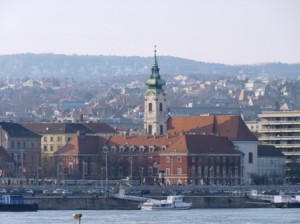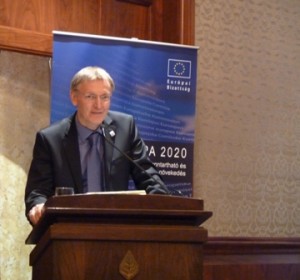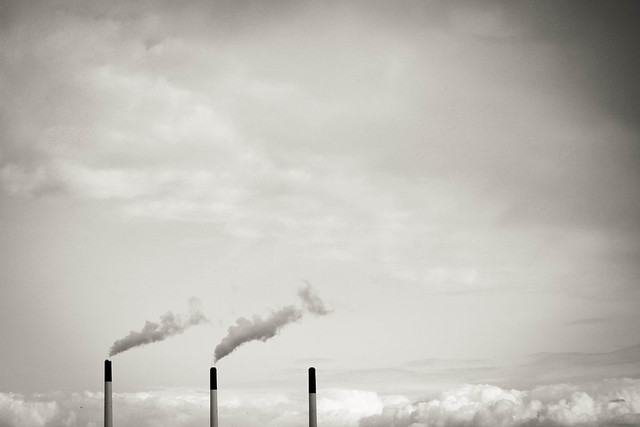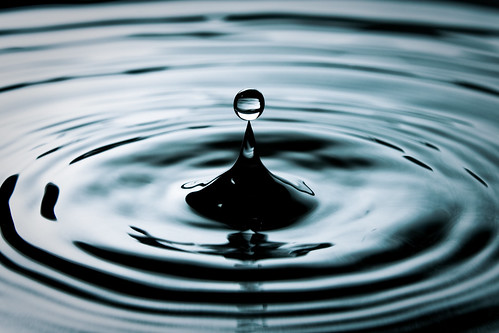On the banks of the blue Danube
 I took a good look at the river Danube in the centre of Budapest in my lunch-break today and in the sunshine on a pleasantly warm spring day, I could just about imagine it was blue like in the famous Strauss waltz. But like most major rivers these days, it is more brown than blue. And the sound all around is of traffic rather than music. The river is wide, flanked by beautiful historic buildings and host to a fleet of tourist boats.
I took a good look at the river Danube in the centre of Budapest in my lunch-break today and in the sunshine on a pleasantly warm spring day, I could just about imagine it was blue like in the famous Strauss waltz. But like most major rivers these days, it is more brown than blue. And the sound all around is of traffic rather than music. The river is wide, flanked by beautiful historic buildings and host to a fleet of tourist boats.
What an apt place for a conference on the “Future of European Waters”. It’s taking place within the framework of the Hungarian Presidency of the EU and I’m here with a group of journalists from different member countries on the invitation of the European Journalism Centre. Water is an “in” topic at the moment. At a high-level meeting here this weekend, the EU Environment Commissioner Janez Potocnik is presenting a “blueprint” for the future of water in the Community.
 Ultimately it’s all about how we treat water as a resource. The Commissioner and the scientists and experts speaking at the conference stress that water as a key resource can never be considered in isolation. We need it to drink, wash, grow crops, for industry, transport, to provide power and, as the disaster in Japan keeps reminding us, to cool nuclear reactors. So all different sectors have to be involved in making sure we have a secure water supply in the future, and that means quality as well as quantity. Demands on water, which is a scarce resource in many places, are rising all the time. And a river like the Danube flows through several different countries, so protecting it cannot just be a national issue. That’s when it becomes clear that Europe has an essential role to play.
Ultimately it’s all about how we treat water as a resource. The Commissioner and the scientists and experts speaking at the conference stress that water as a key resource can never be considered in isolation. We need it to drink, wash, grow crops, for industry, transport, to provide power and, as the disaster in Japan keeps reminding us, to cool nuclear reactors. So all different sectors have to be involved in making sure we have a secure water supply in the future, and that means quality as well as quantity. Demands on water, which is a scarce resource in many places, are rising all the time. And a river like the Danube flows through several different countries, so protecting it cannot just be a national issue. That’s when it becomes clear that Europe has an essential role to play.
Jacqueline McGlade is the Executive Director of the European Environment Agency. She told me here that water had to be the next big topic on the European Agenda, following on from energy and climate change. She mentioned the worrying increase in floods and droughts in Europe. All the climate experts tell us we have to prepare for more extreme weather events. Managing our water resources in a changing climate is becoming an existential issue. When it comes to what it means in practice, the buzzwords seem to be efficiency, technology and recycling. A country like Singapore has developed an effective and complex system to recycle and re-use its water.
The other key issue is coordination and involving all the necessary parties who have a need for or an impact on our water. It makes sense that protecting water is only possible by involving agriculture and industry both as users of water and sources of water pollution, and every sector that needs water. Europe’s water infrastructure – from drinking water to sewage processing – is getting old, a lot of needs to be replaced with more modern technology – but that’s a costly business. Plenty of things to talk about – and, we hope, act upon – for the politicians and experts here on the “blue Danube” this weekend.






